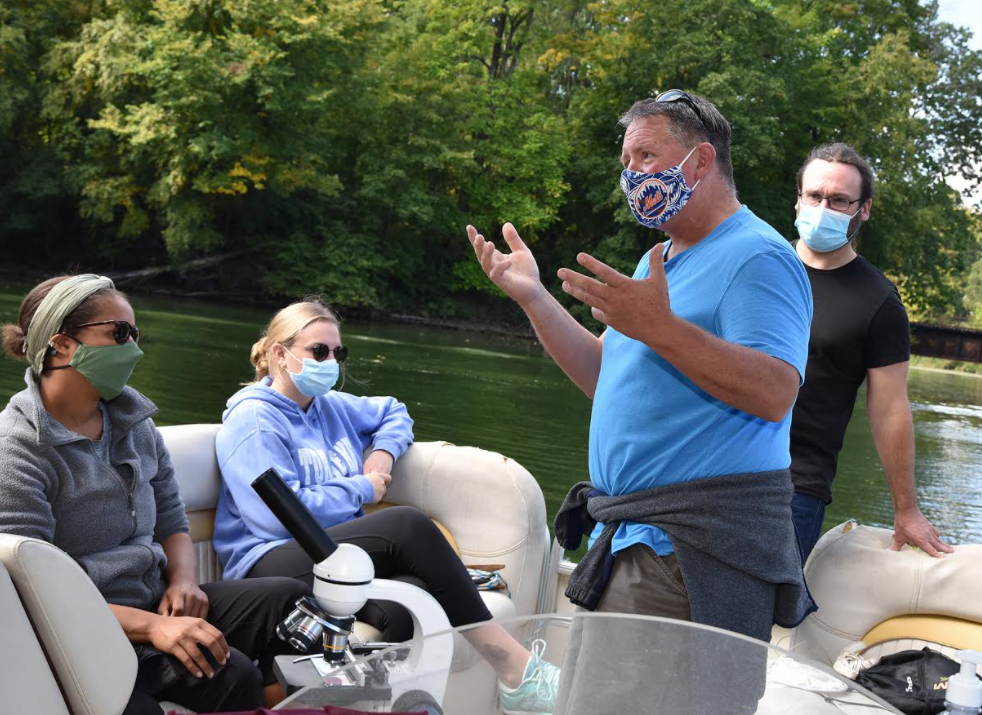
Despite the limitations imposed by the Novel Coronavirus, graduate-level research conducted by students pursuing master’s degrees in Integrative Biological Diversity at Western Connecticut State University continues under the mentorship of department faculty.
Professor of Biological and Environmental Studies Dr. Theodora Pinou, who coordinates the M.S. in Integrative Biological Diversity program, said, “Covid-19 doesn’t stop research, it causes us to get creative about project design and project management. Covid-19 has opened a whole new interest in outdoor experiences, and this can have negative consequences on the environment unless we pay attention to how humans are impacting the environmental health of our ecosystems. Now, more than ever, this Integrated Biological Diversity degree is important to teach a generation of adults proper practices in environmental stewardship and personal responsibility that must be taken to assure human health in relation to the natural world.”
Below is a glimpse of ongoing graduate student research:
Applied Stewardship with Trail Cams — Kendall O’Connell, of Ridgefield, working with Pinou and Assistant Professor of Biology Dr. Hannah Reynolds, has partnered with the Downeast Lakes Land Trust in Maine in the utilization of trail cams to observe and study native wildlife, specifically deer and mid-sized mammals. She will present this work at the Northeast Natural History conference this spring. O’Connell hosted a PRESENCE software training workshop in mid-December, and its application to Occupancy Modeling in ecology research. Two dozen registered participants representing two WCSU departments and four organizations attended.
Endangered Species Management — Kayla DeGuzman, of Sandy Hook, has engaged in the first study to show that rehabilitated Long Island Sound sea turtles can recover and behave like wild animals by returning to warm water feeding grounds after they are released. Her research has been conducted alongside Pinou; the Atlantic Marine Conservation Society; and Dr. Nathan Robinson, a marine scientist and WCSU research affiliate. Endangered Species Research (ESR) is international and interdisciplinary. It covers all endangered forms of life on Earth, the threats faced by species and their habitats, and the necessary steps that must be undertaken to ensure their conservation. ESR publishes high quality contributions reporting research on all species (and habitats) of conservation concern, whether they are classified as Near Threatened or Threatened (Endangered or Vulnerable) by the International Union for the Conservation of Nature and Natural Resources (IUCN) or highlighted as part of national or regional conservation strategies. DeGuzman’s research has been published.
Long Island Sound Sea Turtle Cold Stun Rehabilitation — Kim Durham, of Hampton Bays, New York, serves as the sea turtle stranding coordinator for New York and Connecticut. She is working with Pinou, the New York Department of Environmental Conservation, and Atlantic Marine Conservation Society. Kemp’s Ridley sea turtles wash ashore up and down the New England coast this time of year due to hypothermia. Durham is part of a team of marine rescuers on Long Island who seek to stabilize cold-stunned turtles before transporting them to marine facilities down south for further rehabilitation and ultimately, release.
Loon Conservation — Ericka Griggs, of Hamden, is working to try to reestablish loon populations in Massachusetts. After humans drove common loons to near extinction in Massachusetts in the late 19th century, the birds have been slow to recolonize the state. With settlement money from a 2003 oil spill, a project aims to replenish the population by capturing loon chicks in Maine and relocating them to Massachusetts. Under the mentorship of Associate Professor of Biology Dr. Michelle Monette, Griggs is part of a field team of biologists from the Portland-based nonprofit Biodiversity Research Institute that seeks to reestablish the loon population. Griggs applied for a Graduate Research Fellowship from the National Science Foundation last fall to support her research; she will find out in April if her funding has been approved.
Native Plant Grower Success and Pollinator Connectivity — Samantha Lipscomb, of Seymour, has worked with Assistant Professor of Biology Dr. Rayda Krell to establish a new pollinator garden at Tarrywile Park in Danbury. The project is part of a partnership with WCSU’s Integrated Biological Diversity program, Highstead Arboretum, Hudson to Housatonic, Pollinator Pathway, Ecotype Seed Project, Danbury High School, National Oceanic and Atmospheric Administration, Housatonic Valley Association and Habitat for Humanity.
Norwalk River Habitat Restoration — Southbury resident Kelly Nealon’s applied research takes place in the Norwalk River along Route 7 to bring back a native aquatic plant, hornleaf riverweed, and increase fish habitat. The aquatic plant is being reintroduced to the river after being extirpated — destroyed — at least a century ago. The plant is critical for the health of the river’s fish and insects, and ultimately the waterway itself. This study is being conducted with Professor of Biology Dr. Tom Philbrick, Trout Unlimited and partnering organizations including the Norwalk Valley Association, Town of Wilton, CT Fisheries, and others.
Virtual Lake Symposium — Robbie Mordente, of New Milford, has worked with Pinou, the Connecticut Department of Energy and Environmental Protection and Larry Marsicano of Aquatic Ecosystem Research LLC to present a series of lake symposia covering everything from aquatic invasive plants to harmful algal blooms. The series also featured a Lake Management DEEP Risk Assessment and Educational Instrument roll-out. Attendees at the virtual events included representatives from the Candlewood Lake Authority, Lake Housatonic, Ball Pond, Lake Zoar, Lake Lillinonah, Lake Waubeeka and members of the public who live on or near these bodies of water.
For more information, contact the Office of University Relations at pr@wcsu.edu.